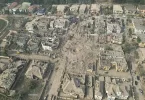
Dozens have already died in the fighting between Israel and Hamas, and more will perish if the fighting continues to escalate.
The current violence began with a series of conflicts in Jerusalem.
Israeli police in the city blocked off the Damascus Gate, a popular gathering place for Arabs during Ramadan, sparking protests. An attempt by Jewish settlers to evict longtime Arab residents of Sheikh Jarrah, an Arab neighborhood of East Jerusalem, inflamed tensions, leading to violent clashes with Israeli police. Arab youth attacked ultra-Orthodox Jews in the city, and Jewish extremists assailed Arab residents. All of this culminated in a violent Israeli police raid on the al-Aqsa Mosque, Jerusalem’s holiest site for Muslims, located on the Temple Mount (the holiest site in the world for Jews).
Then Hamas fired rockets at Jerusalem. Ostensibly, this was a display of solidarity with the protesters on the ground. But it appears to have been a political calculation — Hamas attempting to capitalize on Palestinian anger over the violence in Jerusalem to expand its own influence, especially in the wake of recently canceled Palestinian elections that likely would have strengthened its political position.
“This is much more about internal Palestinian politics than it is about what’s been going on in Jerusalem,” says Michael Koplow, policy director at the Israel Policy Forum.
The attacks on Jerusalem crossed what Israeli Prime Minister Benjamin Netanyahu referred to as a “red line,” breaking the unspoken rules that limited the pace and range of rocket attacks to limited barrages mostly targeting southern Israel. Israel responded with overwhelming force: massive airstrikes targeting Hamas emplacements in densely populated Gaza. This prompted more rocket attacks from Hamas and, in turn, more bombings from Israel. As a result, at least seven people in Israel and around 70 Palestinians are dead — with no end in sight.

But while the events that led to this point are unique, the broader pattern of events is not. This week’s violence is part of a recurring pattern determined by structural factors in the conflict. If the events in Jerusalem hadn’t prompted Hamas rocket fire and Israeli escalation, something else almost certainly would have.
Stay tuned for more updates….







